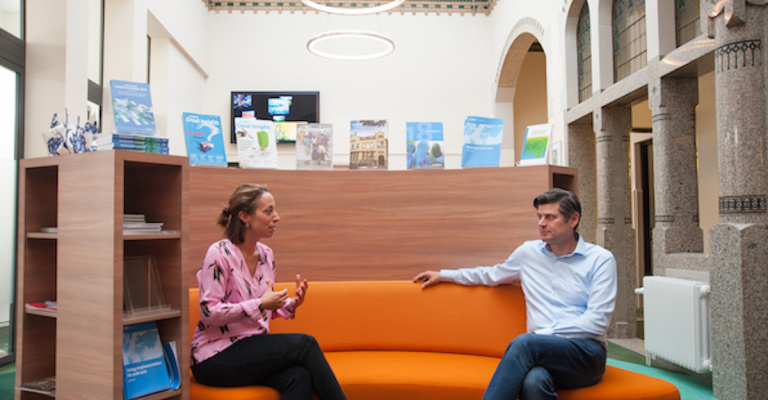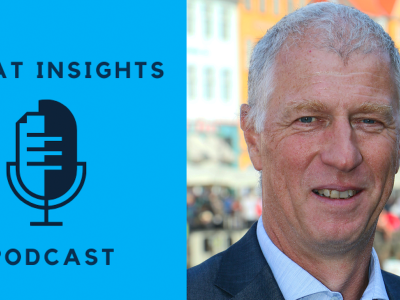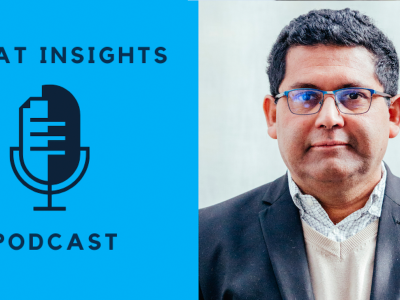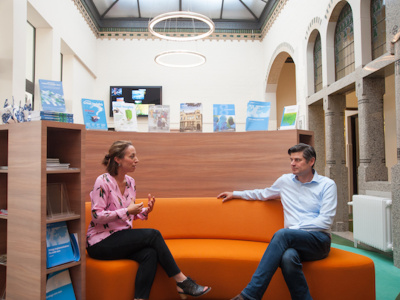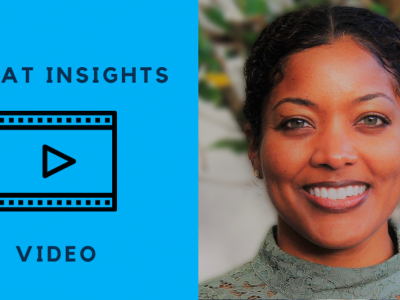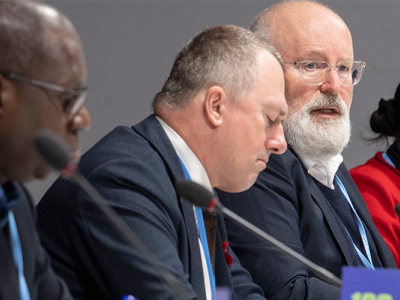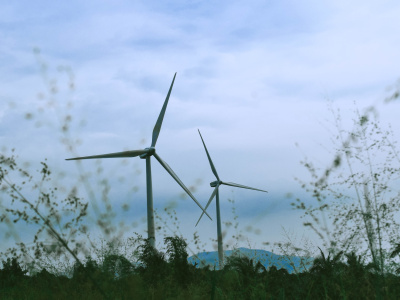
Dutch lawyer brings the courts into the fight against climate change, and wins
“Facts don’t always matter in the political arena and the media. But they do matter in a court of law”, says Roger Cox, the Dutch lawyer now known as ‘the man who beat Shell’. Cox speaks with ECDPM policy officer Hanne Knaepen on the dangers of government inaction on climate change.
What made you devote your life to the fight against climate change?
I always had an interest in nature. But the urgency of climate change didn’t really sink in with me until I watched Al Gore’s 2006 documentary, ‘An Inconvenient Truth’. After seeing it, I was astounded that this wasn’t all over the news. I felt we had been kept in the dark by the media and politicians who had failed to report and act on what was really happening. I was also angry at myself for underestimating the problem, thinking a small rise in global temperature or sea level wasn’t really an issue. There is still a huge knowledge gap among the general public, the media, politicians and the CEOs of large companies. That means the problem is not yet being tackled and continues to grow.
I also felt a moral obligation to my children. If I chose to be ignorant, how could I justify it to them 20 years from now? Al Gore’s documentary made me dive deeper into the issue. To inform more people, we set up a foundation that organised free screenings of the film at 20 cinemas across the Netherlands. I also became actively involved in the circular economy and the cradle-to-cradle concept, and I spent a lot of my free time reading about climate change, its causes and consequences.
In your book ‘Revolution Justified’ you state that only the law can save us now. What motivated you to take on Shell, one of the world’s biggest oil companies?
In my book, I explain that we can only stop climate change if we change the fossil fuel-based energy system we are currently in. We are still very much dependent on fossil fuels, and there are strong links between those who profit from that dependence and those with the power to change it, like Royal Dutch Shell, which is responsible for 2% of global CO2 emissions.
Science has shown us the course we have to take, but we are still stuck in the status quo. We all know there is an urgent problem, but our governments and large multinational energy companies have failed to act and are unwilling to set adequate long-term climate strategies, too concerned with quarterly figures and election cycles. Only the law seems strong enough to break this political and commercial status quo.
Few people know that we are currently only just experiencing the full consequences of our CO2 emissions until the1980s, because there is a 30-50 year delay in CO2 emissions and their global warming impact. That means there is more warming in the pipeline that cannot be avoided anymore, and our emissions of tomorrow will add additional warming on top of that. That’s why we have to act now if we want to come anywhere near the goals we set in the Paris Agreement. It’s like steering a big oil tanker: you have to hit the brake before land is in sight to avoid hitting the harbour wall.
Regarding Shell, the purpose of starting a case against them, with Friends of the Earth and others, was to hold them accountable for the damage they knowingly caused since the early 1990s and to obtain a court order forcing them to reduce their emissions. [The Dutch court ruled that Royal Dutch Shell must reduce its global emissions by 45% by 2030.] Facts don’t always matter in the political arena and the media. But they do matter in a court of law. All parties have the opportunity to give evidence, present their arguments and are listened to in full transparency. To understand why the judges ruled in our favour, you have to understand that climate change is a full-fledged human rights issue. Therefore one can demand that large companies and governments take responsibility for reducing CO2 emissions.
Have you seen significant changes in Dutch policy since the Urgenda case in 2015? Are we now on track to supplying everyone with green energy?
Some changes have been made, but not enough. The ruling by the court in 2015, the appeal court in 2018 and the supreme court in 2019, ordered the Dutch government to immediately take effective action against climate change and reduce CO2 emissions by at least 25% by the end of 2020 [compared to 1990 levels]. We’ve nearly reached that goal, but that is in part due to the COVID-19 crisis and not necessarily only because of actions by our government. Similar lawsuits in Germany triggered that government to pass a new climate action law that brings the neutrality target forward to 2045 via reductions of at least 65% in 2030.
To achieve the goals of the Paris Agreement, the EU Green Deal target of 55% emissions reduction by 2030 is not enough. To make this happen, the 65% reduction as set by Germany should be followed by the EU as well. As western countries we are obliged to take the lead in tackling the global warming problem. On top of that, we have a historical debt to the countries of the South to allow them to develop, which now can only happen responsibly if they “leap frog”, i.e. choose renewable energy and skip the fossil fuel [dependency] step as much as possible. It is our obligation as western countries to assist and support the countries of the South through finance, knowledge transfer and other obligations we rightfully accepted in the Paris Agreement.
Will the impacts of climate change be most noticeable in the Global South?
Climate changes will in the first instance be felt most strongly in the South. It is true that those who are most dependent on the climate for their livelihoods [like small farmers and fishers] will be most affected, and they also don’t have the funds to adapt. We have seen longer droughts and heavier rainfall in Africa, but in places like North America and Europe too, temperatures are at a historic high. Every update science has given us in the past years paints a more serious picture than the one previous. Climate related disasters are happening all over the world and this trend will only worsen in the coming decades. That’s due to the earlier mentioned delay of 30-50 years, but we still can avoid the worst impacts of climate change, if we push to achieve the Paris Goals.
We’ve recently seen groups of activist shareholders instigating changes in oil companies, like ExxonMobile and Chevron, by replacing board members who were not doing enough for sustainability. Will that affect the energy transition?
There are many ways to increase pressure and instigate change, as we saw with the mass youth climate strikes, which unfortunately were brought to a halt by COVID-19. They were creating a huge following and momentum, putting pressure on politicians and CEOs. Now shareholders are also creating more pressure on companies to better prepare for the energy transition and its financial fall out. We are currently living in a ‘carbon bubble’, as the monetary value of the oil and gas reserves of companies are already activated on their balance sheets. But we need to keep most of these reserves in the ground if we are to achieve the Paris Agreement goals. That makes those reserves worthless. Shareholders want their board members to have a better understanding of these financial risks for their companies and this will be helpful for the energy transition.
What does the future hold for coal, oil and gas companies? Can they achieve a green transition? Also, do you see an impact of the European Green Deal on companies and public sector activities?
The position of large companies like Shell and the European Green Deal are two different things. The crux is, large influential fossil fuel companies have much greater CO2 emissions than countries like the Netherlands or Belgium [which emit 10-15 times less]. That makes these companies big players with enormous revenues, but they can also heavily invest. They can make a difference by phasing out their investments in fossil fuels and switching investments to renewable energy. Moreover, the judges ruled that they have a legal responsibility to do so, because they contributed heavily to the situation we are in now. It is time for them to take up that responsibility and help create a more sustainable society, to repay their debt by contributing to a healthy and safe environment. The Green Deal can support them with that but does not take away their individual responsibility to go above and beyond if necessary. We all have to make sacrifices in the years to come. It requires a major rethink and adjustment in the way we live. It’s like remodelling a house while you’re living in it. It’s going to be uncomfortable and hard, but in the end, it will be worth it.
Could Shell argue that if it ceases production somebody else will take over and therefore nothing changes?
Shell brought that argument to the table, but we managed to convince the court that other companies will not necessarily fill that void, also because the environment around fossil fuels is changing. Since the signing of the Paris Agreement, several governments have been careful or even ceased granting authorisations for new oil or gas exploration. On top of that, there are strong proven links between less production and less consumption. For every barrel of oil not produced, between 0,2 and 0,6 barrels of oil are not consumed. Also, the central premise in the Paris Agreement is that the way to achieve the climate goals is through change in investments and this is exactly what the consequence of the verdict against Shell is. The call for this change is growing, and not only from society, governments and court cases.
Under the European Green Deal, the EU will impose carbon emissions tariffs on imports, including steel and cement. African countries have called this ‘environmental protectionism’. What are your views on a fair, green transition, especially given countries’ right to develop?
First and foremost, I understand this is a very complex issue. What we set out to achieve in the court cases was enforcement of specific CO2 emissions reduction targets. How these targets are achieved is primarily a political issue and not for us to decide. What I can say is that developed countries have been very negligent in their climate policies. They knew since the UN Climate Convention of 1992 that they had to take the lead in tackling the climate problem. But they have seriously underperformed. Courts are correcting this and this is also in the interest of African countries since this is the only way to avoid dangerous climate change. Emissions are a global issue. Their impacts don’t stop at European borders. Reductions in Europe benefit the whole world including the African continent. But the EU will also need to help African countries to transform and further their economies in a sustainable way, by technology transfer, financial assistance and by other means, because we all have so much to lose if we don’t tackle it together. Also companies like Shell could better invest in sustainable energy solutions in Africa than in new fossil fuel infrastructure. The financial gains from fossil fuels coming out of African countries can also best be reinvested in renewables by the ruling parties in the countries themselves.
COP26 takes place in Glasgow later this year. What outcomes are you hoping for?
I think we should stop focusing solely on the 2050 deadline and bring these goals forward to 2030. If we still want to halt climate change, halving worldwide emissions in the next 9 years is crucial. That is a very very big task. The developed countries need to commit even more to these targets and help developing countries transform their economies. We also need to stop looking for new oil and gas fields and invest in renewables on a much greater scale. I also believe that governments have a task in educating people about the measures that need to be taken and how these will affect them. There is a lot at stake at COP26 and I hope the global community is up to the task. Our common future depends on it.
About Roger Cox
Roger Cox is a Partner with Paulussen Advocaten and a trusted advisor in large projects in the real estate, infrastructure and energy sector and has extensive experience in structuring public-private partnership. Roger is also a successful litigator and is known around the world for his precedent setting litigation work in the so called Urgenda climate case. He is also founder of the Planet Prosperity Foundation, through which he promotes the circular economy and a visiting university lecturer and senior fellow with the Centre for International Governance Innovation in Waterloo, Canada. He was recently elected as one of the most influential people in the Time 100 list.
Read the full magazine issue
This article appears in the climate edition of ECDPM's Great Insights magazine – check out the full issue or the other articles and multimedia below.

